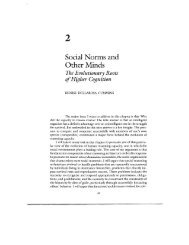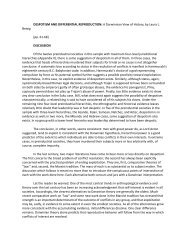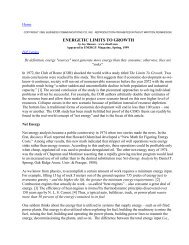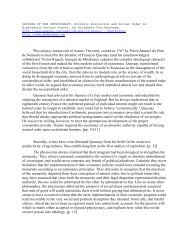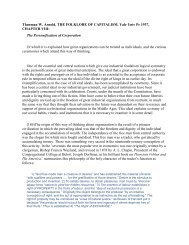- Page 2:
February 2001 ISBN 0-262-07214-9 37
- Page 6:
2 Gerd Gigerenzer andReinhard Selte
- Page 10:
4 Gerd Gigerenzer andReinhard Selte
- Page 14:
6 Gerd Gigerenzer and Reinhard Selt
- Page 18: 8 Gerd Gigerenzer and Reinhard Selt
- Page 22: 10 Gerd Gigerenzer and Reinhard Sel
- Page 26: 12 Gerd Gigerenzer and Reinhard Sel
- Page 30: 14 Reinhard Selten decision alterna
- Page 34: 16 Reinhard Selten only an optimal
- Page 38: 18 Reinhard Selten ASPIRATION ADAPT
- Page 42: 20 Reinhard Selten The process may
- Page 46: 22 Reinhard Selten last period's va
- Page 50: 24 Reinhard Selten 2. local procedu
- Page 54: 26 Reinhard Selten whether the town
- Page 58: 28 Reinhard Selten The term ex post
- Page 62: 30 Reinhard Selten Human Problem So
- Page 66: 32 Reinhard Selten indirect influen
- Page 72: What Is Bounded Rationality? 35 wor
- Page 76: 3 The Adaptive Toolbox Gerd Gigeren
- Page 80: demons The Adaptive Toolbox 39 visi
- Page 84: The Adaptive Toolbox 41 cues or rea
- Page 88: The Adaptive Toolbox 43 reasoning t
- Page 92: The Adaptive Toolbox 45 instability
- Page 96: The Adaptive Toolbox 47 weighted li
- Page 100: The Adaptive Toolbox 49 Czerlinski,
- Page 104: 4 Fast and Frugal Heuristics for En
- Page 108: Fast and Frugal Heuristics for Envi
- Page 112: Fast and Frugal Heuristics for Envi
- Page 116: Fast and Frugal Heuristics for Envi
- Page 120:
Fast and Frugal Heuristics for Envi
- Page 124:
Fast and Frugal Heuristics for Envi
- Page 128:
Fast andFrugal Heuristics for Envir
- Page 132:
Fast andFrugalHeuristics forEnviron
- Page 136:
Fast and Frugal Heuristics for Envi
- Page 140:
Fast andFrugal Heuristics for Envir
- Page 144:
5 Evolutionary Adaptation and the E
- Page 148:
Evolutionary Adaptation and Economi
- Page 152:
Evolutionary Adaptation and Economi
- Page 156:
Evolutionary Adaptation and Economi
- Page 160:
Evolutionary Adaptation and Economi
- Page 164:
Evolutionary Adaptation and Economi
- Page 168:
6 Group Report: Is There Evidence f
- Page 172:
Is There Evidence for an Adaptive T
- Page 176:
Is There Evidence for an Adaptive T
- Page 180:
Is There Evidence for an Adaptive T
- Page 184:
Is There Evidence for an Adaptive T
- Page 188:
Is There Evidence for an Adaptive T
- Page 192:
Is There Evidence for an Adaptive T
- Page 196:
Is There Evidence for an Adaptive T
- Page 200:
Is There Evidence for an Adaptive T
- Page 204:
Is There Evidence for an Adaptive T
- Page 208:
7 The Fiction of Optimization Gary
- Page 212:
The Fiction of Optimization 105 som
- Page 216:
The Fiction of Optimization 107 Doe
- Page 220:
The Fiction of Optimization 109 Tab
- Page 224:
The Fiction of Optimization 111 fee
- Page 228:
8 Preferential Choice and Adaptive
- Page 232:
Preferential Choice and Adaptive St
- Page 236:
Preferential Choice and Adaptive St
- Page 240:
Preferential Choice and Adaptive St
- Page 244:
Preferential Choice and Adaptive St
- Page 248:
Preferential Choice and Adaptive St
- Page 252:
A Preferential Choice and Adaptive
- Page 256:
Preferential Choice and Adaptive St
- Page 260:
Preferen tial Choice and Adaptive S
- Page 264:
Preferential Choice and Adaptive St
- Page 268:
Preferential Choice and Adaptive St
- Page 272:
Preferential Choice and Adaptive St
- Page 276:
148 Laura Martignon limited time, k
- Page 280:
150 Laura Martignon Step 3. Decisio
- Page 284:
152 Laura Martignon and orders them
- Page 288:
154 Laura Martignon The argument of
- Page 292:
156 Laura Martignon i.e., each weig
- Page 296:
158 Laura Martignon information is
- Page 300:
160 Laura Martignon • 80 of every
- Page 304:
162 Laura Martignon we can imagine
- Page 308:
164 Laura Martignon In symbols: Pro
- Page 312:
166 Laura Martignon Figure 9.4 Tree
- Page 316:
168 Laura Martignon inherent struct
- Page 320:
170 Laura Martignon construction me
- Page 324:
10 Group Report: Why and When Do Si
- Page 328:
Why and When Do Simple Heuristics W
- Page 332:
Why and When Do Simple Heuristics W
- Page 336:
Why and When Do Simple Heuristics W
- Page 340:
Why and When Do Simple Heuristics W
- Page 344:
Why and When Do Simple Heuristics W
- Page 348:
Why and When Do Simple Heuristics W
- Page 352:
Why and When Do Simple Heuristics W
- Page 356:
Why and When Do Simple Heuristics W
- Page 360:
11 Emotions and Cost-benefit Assess
- Page 364:
Emotions and Cost-benefit Assessmen
- Page 368:
Emotions and Cost-benefit Assessmen
- Page 372:
Emotions and Cost-benefit Assessmen
- Page 376:
Emotions and Cost-benefit Assessmen
- Page 380:
Emotions and Cost-benefit Assessmen
- Page 384:
Emotions and Cost-benefit Assessmen
- Page 388:
Emotions and Cost-benefit Assessmen
- Page 392:
Emotions and Cost-benefit Assessmen
- Page 396:
Emotions and Cost-benefit Assessmen
- Page 400:
Emotions and Cost-benefit Assessmen
- Page 404:
Emotions and Cost-benefit Assessmen
- Page 408:
12 Simple Reinforcement Learning Mo
- Page 412:
Reinforcement Learning and Reciproc
- Page 416:
Reinforcement Learning and Reciproc
- Page 420:
Reinforcement Learning and Reciproc
- Page 424:
Reinforcement Learning and Reciproc
- Page 428:
Reinforcement Learning and Reciproc
- Page 432:
Reinforcement Learning and Reciproc
- Page 436:
Reinforcement Learning and Reciproc
- Page 440:
Reinforcement Learning and Reciproc
- Page 444:
234 Kevin N. Laland observation of
- Page 448:
236 Kevin N. Laland transmission (L
- Page 452:
238 Kevin N. Laland example, reflec
- Page 456:
240 Kevin N. Laland the social tran
- Page 460:
242 Kevin N. Laland example, bats t
- Page 464:
244 Kevin N. Laland A focus on soci
- Page 468:
246 Kevin N. Laland Durham, W.H. 19
- Page 472:
14 Decision Making in Superorganism
- Page 476:
Decision Making in Superorganisms 2
- Page 480:
Decision Making in Superorganisms 2
- Page 484:
11:00-13:00 bees: 18 dances: 68 wag
- Page 488:
Decision Making in Superorganisms 2
- Page 492:
Decision Making in Superorganisms 2
- Page 496:
Decision Making in Superorganisms 2
- Page 500:
15 Group Report: Effects of Emotion
- Page 504:
Effects of Emotions and Social Proc
- Page 508:
Effects of Emotions and Social Proc
- Page 512:
Effects of Emotions and Social Proc
- Page 516:
Effects of Emotions and Social Proc
- Page 520:
Effects of Emotions and Social Proc
- Page 524:
Effects of Emotions and Social Proc
- Page 528:
Effects of Emotions and Social Proc
- Page 532:
Effects of Emotions and Social Proc
- Page 536:
282 Robert Boyd and Peter J. Richer
- Page 540:
284 Robert Boyd and Peter J. Richer
- Page 544:
286 Robert Boyd and Peter J. Richer
- Page 548:
288 Robert Boyd and Peter J. Richer
- Page 552:
290 Robert Boyd and Peter J. Richer
- Page 556:
292 Robert Boyd and Peter J. Richer
- Page 560:
294 Robert Boyd and Peter J. Richer
- Page 564:
296 Robert Boyd and Peter J. Richer
- Page 568:
298 WulfAlbers consecutive full-ste
- Page 572:
300 WulfAlbers and must decide betw
- Page 576:
302 WulfAlbers and only if their di
- Page 580:
304 WulfAlbers considered. Thus, th
- Page 584:
306 WulfAlbers S(r, a) can contain
- Page 588:
308 WulfAlbers however, it also has
- Page 592:
310 WulfAlters utility function, pr
- Page 596:
312 WulfAlbers AGGREGATION OF UTILI
- Page 600:
314 WulfAlters Nash problem with co
- Page 604:
316 WulfAlbers concession steps in
- Page 608:
18 Goodwill Accounting and the Proc
- Page 612:
Goodwill Accounting and the Process
- Page 616:
Goodwill Accounting and the Process
- Page 620:
Environment Information w Personal
- Page 624:
Goodwill Accounting and the Process
- Page 628:
Goodwill Accounting and the Process
- Page 632:
Goodwill Accounting and the Process
- Page 638:
334 Kevin A. McCabe and Vernon L. S
- Page 642:
able 18.3 200 iterations < g < 900.
- Page 646:
338 Kevin A. McCabe and Vernon L. S
- Page 650:
340 Kevin A. McCabe and Vernon L. S
- Page 654:
19 Group Report: What Is the Role o
- Page 658:
What Is the Role of Culture in Boun
- Page 662:
What Is the Role of Culture in Boun
- Page 666:
What Is the Role of Culture in Boun
- Page 670:
What Is the Role of Culture in Boun
- Page 674:
What Is the Role of Culture in Boun
- Page 678:
What Is the Role of Culture in Boun
- Page 682:
What Is the Role of Culture in Boun
- Page 686:
What Is the Role of Culture in Boun
- Page 690:
362 Subject Index Bayesian rational
- Page 694:
364 Subject Index environment conti
- Page 698:
366 Subject Index hill-climbing alg
- Page 702:
368 Subject Index probability 3, 6,
- Page 706:
370 value continued estimation of c
- Page 710:
xii List of Participants with Field
- Page 714:
xiv List of Participants with Field
- Page 718:
Abbink, K. 29 Abdellaoui, M. 92 Ain
- Page 722:
Frisch, D. 104, 127, 134 Gagne,R.M.
- Page 726:
Mitchell, T.R. 130 Mookerjee, D. 21
- Page 730:
Name Index 317 Wong, C. 206 Zajonc,



